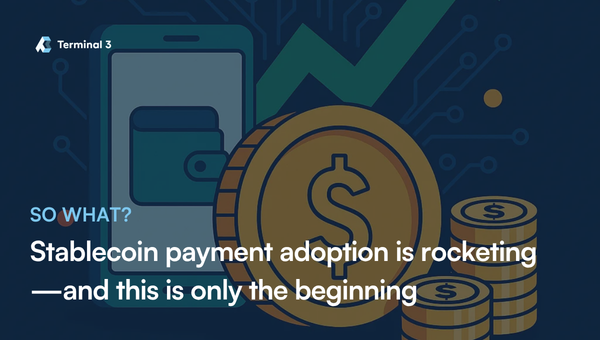Tornado Cash brings privacy to Web3—legal cases against it could dampen future innovation

GM,
The trial of the developers behind a Web3 platform called Tornado Cash is dividing public opinion. Tornado Cash is a service that brings privacy to the transparent world of blockchain-based transactions. One developer has been sentenced to five years in jail in The Netherlands, while another faces trial in the US in July.
Central to the trial is whether software developers should be held responsible for the actions of those who use their services, or whether they should be free to build services without that burden. Either way, this case will set an important precedent for the future of Web3.
Let’s go through the arguments.
Best,
What’s going on?
Tornado Cash was developed in 2019 to allow Web3 users to enjoy privacy. Crypto wallets are, by nature, not tied to an individual’s ID in the way that a bank account is. But, unlike a current account, the content of a crypto wallet and all transfers are public and viewable to anyone.
Tracking the history of any wallet isn’t particularly interesting, but collectively, the crypto industry has identified some prominent wallets, for example that of Ethereum creator Vitalik Buterin. Technology allows his wallet to be monitored with all transactions trackable and broadcasted publicly. It’s understandable, then, that some individuals seek to screen some of their activity in the name of privacy. That’s where services like Tornado Cash, used by Buterin, come into the picture. However, these platforms are also used by malicious actors, such as scammers and hackers, to cover their illegal activity.
Those latter use cases have prompted investigators to accuse Tornado Cash of facilitating money laundering and enabling criminal activity, prompting the most recent trials.
SO WHAT?
1. Privacy is a right for all
Principally, Tornado Cash was developed to provide privacy to Web3 users in a world in which every transaction can be tracked and major wallets are often identified and watched closely.
It is simple to use. Tornado Cash is essentially a mixer where users can deposit Ethereum. They are then given a code that enables the withdrawal of the deposit. Since it mixes deposits from a range of users, the transactions cannot be traced the same way that a direct transaction is. You can track when funds are sent to Tornado Cash, but the trail typically ends there and its end location is obfuscated.

There are plenty of legitimate reasons for requiring anonymity to a transaction. Buterin said on X that one of his main use cases is making donations to charitable causes that might be controversial, including his donations to the Ukraine war efforts. That might sound extreme, but helping with any war effort can be easily tracked on the blockchain and that can have public repercussions.
A number of Buterin’s wallets have been identified and each transaction from them is followed and broadcast. It makes sense that he would look for privacy for a lot of his transactions and not just donations, for example investments, sending money to friends and more. Those examples also apply to less prominent users, too.
2. Privacy platforms are enabling criminal activity
On the negative side, it is clear that Tornado Cash’s ability to obfuscate actions is a feature that’s heavily used by the more nefarious users in Web3.
North Korea’s state-sponsored hackers are one group that is reported to favor Tornado Cash. Reuters reported earlier this month that Lazarus Group, the country’s highest profile hacker collective, laundered nearly $150 million in stolen crypto through the platform in March 2024 alone.
But Tornado Cash does have limits. Two years earlier In March 2022, when the Lazarus Group recorded its most notable heist when it stole $620 million in Ethereum from gaming startup Ronin, it turned to the platform to whitewash its money and clear its tracks, presumably to cash the funds out into real world money to enrich North Korea. This time, however, the sheer amount of Ethereum that it processed was so high that it began to become possible to track where some of the outflows had been moved to.
Binance founder and then-CEO Changpeng Zhao said on X that the exchange was able to recover nearly $6 million in funds. That’s a small amount of the total and, for North Korea, it would likely be seen as mere collateral damage.

When it first sanctioned Tornado Cash in August 2022, the US Treasury estimated that the service had been used to launder more than $7 billion since 2019, with the Lazarus Group namechecked as a major user.
“While the purported purpose is to increase privacy, mixers like Tornado are commonly used by illicit actors to launder funds, especially those stolen during significant heists,” the government wrote in an announcement.
3. A dangerous precedent for an evolving industry
Given those huge figures, you could be forgiven for thinking that taking action against Tornado Cash is case closed and a foregone conclusion. However, experts have warned that the US government is overreaching by holding the developers of the platform directly accountable for money laundering and other criminal activities that they had no direct involvement in.
The law goes after Tornado Cash
Alexey Pertsev, a developer of Tornado Cash, was jailed for five years and four months by a Dutch court earlier this year for money laundering.
Co-founders Roman Storm and Roman Semenov were indicted to the US last year
Storm is set to go on trial in September, while Semenov remains at large
Storm and Semenov, the US government argues, had long known that Tornado Cash was being used to launder money. The fact that they failed to act against it makes them culpable, they claimed.
After the centralized web-based interface went offline last year following US sanctions and the arrests of the cofounders, Tornado Cash transactions dropped by close to 90 percent. However, as a decentralized smart contract, the service remains operational. In March alone, over $283 million flowed into the service.
That still doesn’t mean users, especially those from the US, are able to freely use the service. US citizens face fines or imprisonment if they are found to have used the underlying smart contract, while US companies including Circle—which controls the second-most popular stablecoin—have frozen assets from accounts that interact with Tornado Cash.
Still, the genie is out of the bottle. Tornado Cash’s code has been open sourced and it can be adapted or forked by anyone wanting to build with it. Beyond that, the concern that anyone building software must be responsible for how it has been used would set a chilling precedent. That’s particularly true when it comes to Web3 and newer technologies such as AI, which imagine a new kind of internet and, in some cases, are built experimentally. The potential for jail time will deter such projects from being built or funded—and that could ultimately lead to less innovation.
The trial in September, then, will be pivotal for the future of Web3 technology.
News bytes
Donald Trump was once a crypto skeptic but now he is making support for the industry a major part of his Presidential campaign
We said that consolidation would happen in the Bitcoin mining space and now Riot Platforms is moving to buy rival Bitfarms for $950M—the two are publicly traded so it is an interesting one to watch
Kenya has struck a deal with a Bitcoin mining company to monetize underutilized energy in the country and commit to $80M in investment
PayPal’s US dollar stablecoin—which we analyzed in detail back in August—is launching on the Solana network nearly one year after its debut on Ethereum
Ryan Salame, a former co-CEO of disgraced exchange FTX, was sentenced to 7.5 years in jail for making unlawful campaign donations
Argentina could follow El Salvador’s lead and adopt Bitcoin into its economy, the two governments are discussing cooperation agreements
That’s all for this week!
Share your feedback, questions or requests via email to: sowhat@terminal3.io




